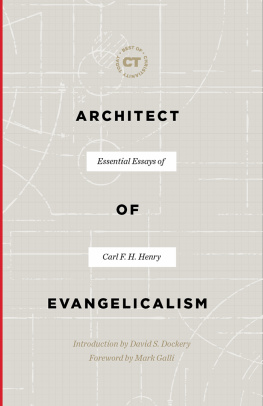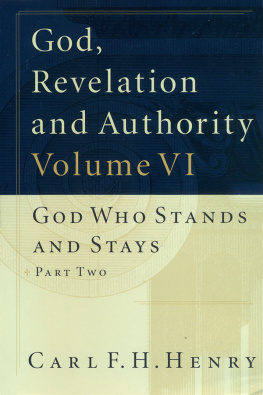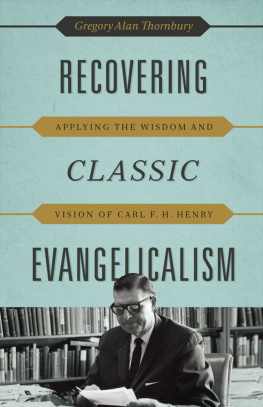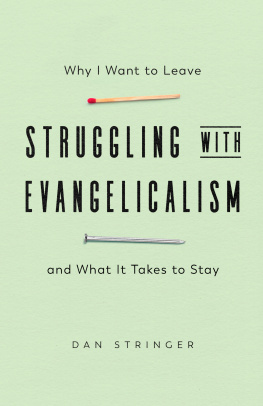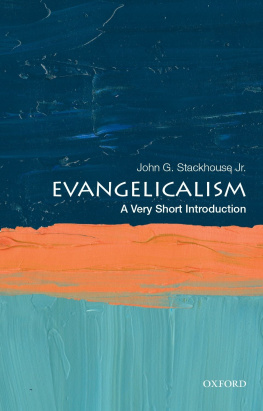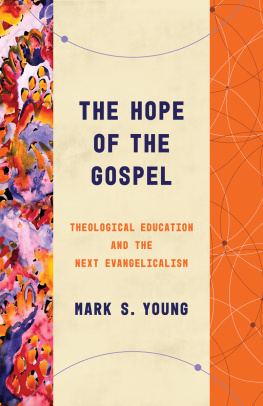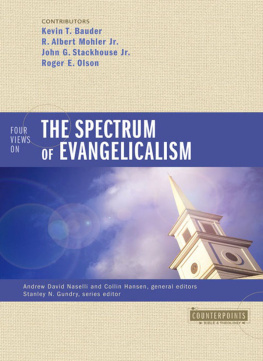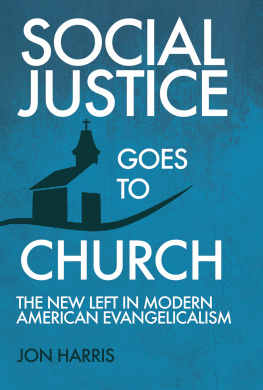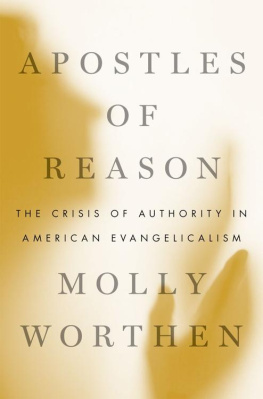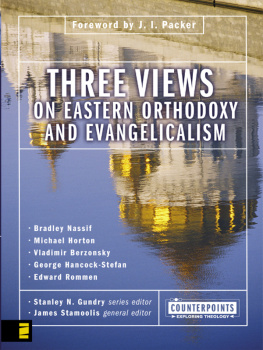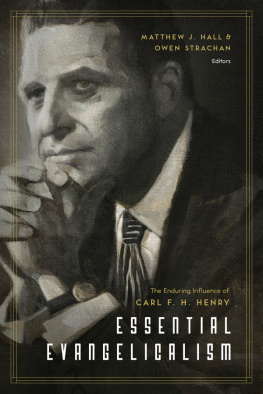
ARCHITECT
Essential Essays of
OF
Carl F. H. Henry
EVANGELICALISM


Architect of Evangelicalism: Essential Essays of Carl F. H. Henry
Best of Christianity Today
Copyright 2019 Christianity Today International
Lexham Press, 1313 Commercial St., Bellingham, WA 98225
LexhamPress.com
All rights reserved. You may use brief quotations from this resource in presentations, articles, and books. For all other uses, please write Lexham Press for permission. Email us at .
Unless otherwise noted, Scripture quotations are from the King James Version. Public domain.
Scripture quotations marked (RSV) are from the Revised Standard Version of the Bible, copyright 1952 [2nd edition, 1971] by the Division of Christian Education of the National Council of the Churches of Christ in the United States of America. Used by permission. All rights reserved.
Print ISBN 9781683593362
Digital ISBN 9781683593379
Lexham Editorial: Elliot Ritzema, Danielle Thevenaz
Cover Design: Lydia Dahl
CONTENTS
by Mark Galli
by David S. Dockery
I f there was ever a time for us to think along with Carl F. H. Henry, now is the time. In glancing through the contents of this book, I was frankly amazed at the number of times Henry touched on themes that we wrestle with today. What most interests me is his ongoing efforts to help evangelicals engage the public square and to do so in a way that was true to the complexity of pursuing justice and the truth of Scripture.
I came of age intellectually in what might be called the post-Henry years. Thats how it seemed to me at least, given the circle of evangelicals I was in. Henry was seen as a man for another time. He was too rationalistic. He drew lines a little finely. And he was too assured of himself.
What Ive discovered in the last decade or so is this: He indeed was rationalistic, but given the Twitteresque and emotional way we carry on theological and political debate these days, we could use a jolting dose of rationalism again.
He was indeed a man for his own times, like all of us are. But unlike most of us, I believe the quality of his thought will bring wisdom to the later generations who take the trouble to read him.
He was indeed assured, and perhaps sometimes of himself. But what mostly bleeds through his words is a fierce devotion to Jesus Christ and biblical truth. Anyone who displays that type of passion is going to be accused of being too assured now and then.
When another Karl, Karl Barth, visited America in 1962, he spoke in Washington, DC. Carl Henry was in the audience, and during the question and answer session, he stood, identified himself, and asked a question. Henry relates the moment in his autobiography:
The question, Dr. Barth, concerns the historical factuality of the resurrection of Jesus. I pointed to the press table and noted the presence of leading reporters. If these journalists had their present duties in the time of Jesus, I asked, was the resurrection of such a nature that covering some aspect of it would have fallen into their area of responsibility? Was it news, I asked, in the sense that the man in the street understands news?
Henry was trying to see if Barth was committed to the historicity of the resurrection.
Im sure what was going through Barths mind was his previous interactions with editors of Christianity Today. Some questions had been submitted to Barth through Geoffrey Bromiley, translator of Barths Dogmatics, but Barth refused to answer their queries. He likened them to an inquisition, saying, These people have already had their so-called orthodoxy for a long time. They are closed to anything else.
Henry continues,
Barth became angry. Pointing at me, and recalling my identification, he asked: Did you say Christianity Today or Christianity Yesterday? The audiencelargely
Carl Henry at his assured best!
To the degree that Henry was merely self-assured, hed be the first to eschew pride. We live in a time, however, when some of the most fundamental truths of the gospel are questioned and doubted and debated afresh. If only there were more intellectuals of Henrys caliber who had the assurance to affirm publicly and without shame the truth of the gospel yesterday, today, and forever.
Mark Galli
Editor in Chief, Christianity Today
O n December 7, 2003, Carl F. H. Henry, the intellectual giant of the evangelical movement, was called home by our Lord at the age of ninety. Born the eldest of eight children on January 22, 1913, to German immigrant parents in New York City, Henrys life reflected much of broader American life in the twentieth century. Following high school, Henry was focused on a career in journalism. He served as a reporter for the New York Herald Tribune and the New York Daily News, and covered a section of Long Island for The New York Times.
It was through his experience as a journalist that he came in touch with the Oxford Group, and at twenty he encountered the truth of the Christian gospel and trusted in Jesus Christ. After he heard Wheaton College president J. Oliver Buswell deliver a persuasive defense of the Christian faith, he left his promising journalism career to enroll at Wheaton in 1935. While there, the young Henry made friends with Billy Graham and studied with philosopher Gordon Clark. He also met his future wife Helga Bender; they would marry in 1940 and have two children. Henry went on to complete his BA and MA at Wheaton, earn an MDiv and ThD at Northern Baptist Seminary, and later a PhD in philosophy with Edgar Brightman at Boston University.
Growing Influence and Christianity Today
After teaching from 1942 to 1947 at Northern Baptist Seminary, he was invited by visionaries Charles E. Fuller and Harold J. Ockenga to join the faculty of the new Fuller Theological Seminary in Pasadena, California. Henry emerged as a key leader of the new seminary, serving as dean of the faculty and coordinator of the annual Rose Bowl Sunrise Service. In the same year he went to Fuller, Henry published his first significant book, The Uneasy Conscience of Modern Fundamentalism. The prophetic message of this work, combined with the new platform at Fuller, paved the way for Henry to become the architect of evangelicalism. The themes expounded in Uneasy Conscience proleptically pointed to the emphases that characterized Henrys life and writings for the next several decades.
Less than a decade after his move to Pasadena, Henry in 1956 accepted the invitation to serve as founding editor of Christianity Today (CT) . Henrys background in journalism as well as his growing reputation as an academic leader and evangelical statesman made him the ideal person to lead the CT project as envisioned by Graham and Ockenga. From his post as editor, he solidified his leadership within American Christianity, climaxing with the chairmanship of the World Congress on Evangelism in Berlin in 1966 .
This book represents the best of Henrys contributions to the pages of CT , laying out themes that are also regularly found in the fifty books that Henry authored or edited. Throughout his writings, Henry convictionally articulated an unflinching commitment to the centrality of the gospel and the authority of Scripture while calling for serious engagement with the culture and the pressing issues of the day. Henrys irenic spirit enabled him to interact with others in an engaging way while holding unapologetically to the truthfulness of historic Christianity.

